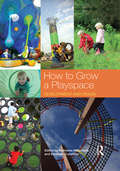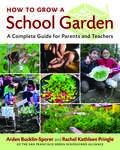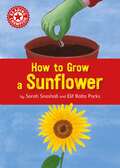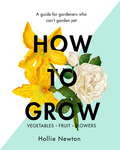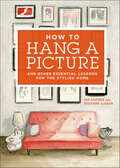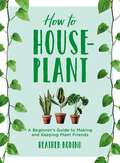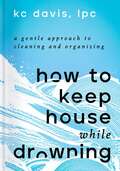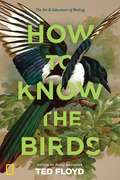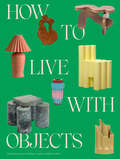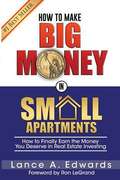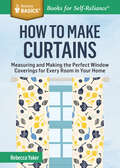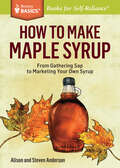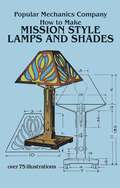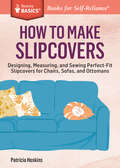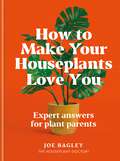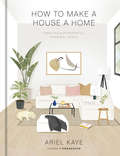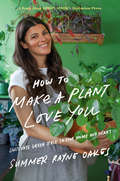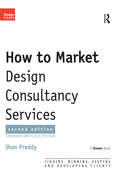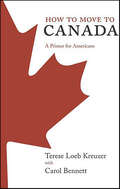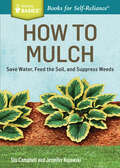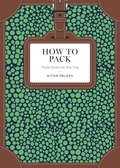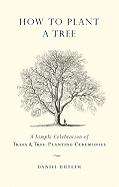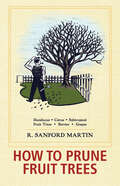- Table View
- List View
How to Grow a Playspace: Development and Design
by Katherine Masiulanis Elizabeth CumminsHow to Grow a Playspace takes you through a global perspective of the different stages of child development and the environments that engage children in play around the world. From the urbanity of Mumbai; to rainbow nets in Japan; nature play in Denmark; recycling waste in Peru; community building in Uganda; play streets in London; and gardens of peace in Palestine, it proves that no matter where play occurs, it is ubiquitous in its resourcefulness, imagination and effect. Written by international leaders in the field of play including academics, designers and playworkers, How to Grow A Playspace discusses contemporary issues around children and play, such as risk benefit in play, creativity and technology, insights into children’s thinking, social inclusion and what makes a city child-friendly. With its own ‘Potting Shed’, this text is also a practical guide to support playspace projects with advice on teams, budgets, community engagement, maintenance and standards. How to Grow a Playspace is a comprehensive ‘go-to’ guide for anyone interested or involved in children’s play and playspaces.
How to Grow a School Garden: A Complete Guide for Parents and Teachers (In The Barn Ser.)
by Arden Bucklin-Sporer Rachel Pringle“A school garden is a tremendously valuable tool to help young people turn book knowledge into real experience. This book is a must-have resource for anyone considering embarking on a youth gardening adventure.” —Mike Metallo, President, National Gardening Association In this groundbreaking resource, two school garden pioneers offer parents, teachers, and school administrators everything they need to know to build school gardens and to develop the programs that support them. Today both schools and parents have a unique opportunity—and an increasing responsibility—to cultivate an awareness of our finite resources, to reinforce values of environmental stewardship, to help students understand concepts of nutrition and health, and to connect children to the natural world. What better way to do this than by engaging young people, their families, and teachers in the wondrous outdoor classroom that is their very own school garden? It's all here: developing the concept, planning, fund-raising, organizing, designing the space, preparing the site, working with parents and schools, teaching in the garden, planting, harvesting, and even cooking, with kid-friendly recipes and year-round activities. Packed with strategies, to-do lists, sample letters, detailed lesson plans, and tricks of the trade from decades of experience developing school garden programs for grades K–8, this hands-on approach will make school garden projects accessible, inexpensive, and sustainable.
How to Grow a Sunflower: Independent Reading Non-fiction Red 2 (Reading Champion #515)
by Sarah SnashallThis book is part of Reading Champion, a series carefully linked to book bands to encourage independent reading skills, developed with UCL Institute of Education (IOE)How to Grow a Sunflower is a non-fiction text instructing how to grow a sunflower. The repeated sentence structure offers readers the opportunity for a first independent reading experience with the support of the illustrations.Reading Champion offers independent reading books for children to practise and reinforce their developing reading skills.This early non-fiction text is accompanied by engaging artwork and a reading activity. Each book has been carefully graded so that it can be matched to a child's reading ability, encouraging reading for pleasure.
How to Grow: A guide for gardeners who can't garden yet
by Hollie Newton'I like that you call brussel sprouts w*nkers' - DIANE MORGAN/PHILOMENA CUNK'Your book was our bible all summer' - PEARL LOWE'As a gardening beginner/twit I'm a huge fan' - KEELEY HAWESThis is the gardening book reimagined for a new generation. A book for people who want to learn how to grow things, but haven't got a clue where to start.With the average person now spending an enormous 8 hours and 41 minutes in front of a screen every day, gardening is an easy way to escape for half an hour. Whether on a rented balcony or a sunny kitchen windowsill, it turns out growing something with your own two hands can make you feel better. Which is where HOW TO GROW comes in. Irreverent and inspiring, this book will equip you with all the know-how and confidence you need to take your first steps into a lifelong gardening love affair - trowel in one hand, drink in the other.From growing your first wonky courgette to completely transforming a shady patio garden, in HOW TO GROW, self-taught gardener Hollie Newton divulges all the secrets she's discovered over the past few years as she's journeyed from gardening novice to vegetable-grower-extraordinaire - all from her pint-sized London garden. With chapters on easy-to-grow veg, fruit, herbs, salad and flowers (along with plenty of tried-and-tested guidance to keeping those plants alive, and delicious recipes to make the most of your haul), you'll also learn everything from the basics of planning your garden to stylish design ideas.Focusing on small and urban spaces and including beautiful photography throughout, this is practical advice for a whole new generation of gardeners.
How to Grow: A guide for gardeners who can't garden yet
by Hollie NewtonThis is the gardening book reimagined for a new generation. A book for people who want to learn how to grow things, but haven't got a clue where to start.With the average person now spending an enormous 8 hours and 41 minutes in front of a screen every day, gardening is an easy way to escape for half an hour. Whether on a rented balcony or a sunny kitchen windowsill, it turns out growing something with your own two hands can make you feel better. Which is where HOW TO GROW comes in. Irreverent and inspiring, this book will equip you with all the know-how and confidence you need to take your first steps into a lifelong gardening love affair - trowel in one hand, drink in the other.From growing your first wonky courgette to completely transforming a shady patio garden, in HOW TO GROW, self-taught gardener Hollie Newton divulges all the secrets she's discovered over the past few years as she's journeyed from gardening novice to vegetable-grower-extraordinaire - all from her pint-sized London garden. With chapters on easy-to-grow veg, fruit, herbs, salad and flowers (along with plenty of tried-and-tested guidance to keeping those plants alive, and delicious recipes to make the most of your haul), you'll also learn everything from the basics of planning your garden to stylish design ideas.Focusing on small and urban spaces and including beautiful photography throughout, this is practical advice for a whole new generation of gardeners.
How to Hang a Picture: And Other Essential Lessons for the Stylish Home
by Jay Sacher Suzanne LaGasaLike tying a Windsor knot or brewing a perfect cup of coffee, knowing how to hang art on your wall is a hallmark of everyday style and nuts-and-bolts know-how. The where, what, and whys of hanging art are an overlooked, under-appreciated line of inquiry. Most of us simply wing it with a quick eyeball and a swing of the hammer. How hard can it be? we think. What can go wrong? The answer, of course, is plenty: crumbling plaster, ruined antique laths, mismatched art hung too-close together, or a poorly-mounted photograph warping in its frame. But beyond the technical mishaps, there is a more essential lesson to be learned: The skill and consideration with which you decorate your home makes an aesthetic statement about the world you inhabit-and more importantly, when it's done right, it very clearly looks a whole lot better. Slim and stylish, How to Hang a Picture: And Other Essential Lessons for a Stylish Home is a user-friendly guidebook that details everything you need to know about hanging, framing, decorating and displaying art. If Strunk & White's Elements of Style was crossed with a no-nonsense how-to manual, you will have captured the tone and immediacy of How to Hang a Picture: simple rules and essential information presented with charm and intelligence.
How to Houseplant: A Beginner's Guide to Making and Keeping Plant Friends (How To Ser.)
by Heather RodinoA fun, gifty guide to growing and caring for the top 50 houseplants! In this fun and accessible guide, you&’ll learn how to care for 50 of the most popular houseplants, from the fiddle-leaf fig to the moth orchid. The plant profiles outline care requirements, and an introduction to houseplant basics explains all you need to know about potting soil, watering, common pests, and more. Houseplants are more popular than ever: as expert writer and gardening enthusiast Heather Rodino notes, &“plants have demonstrated therapeutic value, clean the air, and are an affordable way of decorating, adding beauty to your home, and making even the smallest rented space feel like your own.&” She offers a lighthearted, colorfully illustrated overview of caring for your indoor garden, profiling 50 of the most popular houseplants, from the Boston fern and the fiddle-leaf fig to the moth orchid. Her accessible advice on handling pests and diseases, troubleshooting problems, and assessing your growing conditions, will give novices the confidence they need to begin nurturing their own collection. Tips and list detail everything from which plants are pet-friendly to the top five plants for frequent travelers.
How to Keep House While Drowning: A Gentle Approach to Cleaning and Organizing
by KC DavisKC Davis offers a compassionate approach to cleaning and organizing, helping you transform your home without guilt. A perfect Mother&’s Day gift for moms seeking peace and practical solutions.If you&’re struggling to stay on top of your to-do list, you probably have a good reason: anxiety, fatigue, depression, ADHD, or lack of support. For therapist KC Davis, the birth of her second child triggered a stress-mess cycle. The more behind she felt, the less motivated she was to start. She didn&’t fold a single piece of laundry for seven months. One life-changing realization restored her sanity—and the functionality of her home: You don&’t work for your home; your home works for you. In other words, messiness is not a moral failing. A new sense of calm washed over her as she let go of the shame-based messaging that interpreted a pile of dirty laundry as &“I can never keep up&” and a chaotic kitchen as &“I&’m a bad mother.&” Instead, she looked at unwashed clothes and thought, &“I am alive,&” and at stacks of dishes and thought, &“I cooked my family dinner three nights in a row.&” Building on this foundation of self-compassion, KC devised the powerful practical approach that has exploded in popularity through her TikTok account, @domesticblisters. The secret is to simplify your to-do list and to find creative workarounds that accommodate your limited time and energy. In this book, you&’ll learn exactly how to customize your cleaning strategy and rebuild your relationship with your home, including: -How to see chores as kindnesses to your future self, not as a reflection of your worth -How to start by setting priorities -How to stagger tasks so you won&’t procrastinate -How to clean in quick bursts within your existing daily routine -How to use creative shortcuts to transform a room from messy to functional With KC&’s help, your home will feel like a sanctuary again. It will become a place to rest, even when things aren&’t finished. You will move with ease, and peace and calm will edge out guilt, self-criticism, and endless checklists. They have no place here.
How to Know the Birds: The Art and Adventure of Birding
by Ted FloydBecome a better birder with brief portraits of 200 top North American birds. This friendly, relatable book is a celebration of the art, science, and delights of bird-watching.How to Know the Birds introduces a new, holistic approach to bird-watching, by noting how behaviors, settings, and seasonal cycles connect with shape, song, color, gender, age distinctions, and other features traditionally used to identify species. With short essays on 200 observable species, expert author Ted Floyd guides us through a year of becoming a better birder, each species representing another useful lesson: from explaining scientific nomenclature to noting how plumage changes with age, from chronicling migration patterns to noting hatchling habits. Dozens of endearing pencil sketches accompany Floyd's charming prose, making this book a unique blend of narrative and field guide. A pleasure for birders of all ages, this witty book promises solid lessons for the beginner and smiles of recognition for the seasoned nature lover.
How to Live with Objects: A Guide to More Meaningful Interiors
by Monica Khemsurov Jill SingerFrom the editors of Sight Unseen, an anti-decorating book that champions a new approach to interiors—simply surrounding yourself with objects you love.&“A refreshing, and necessary, counternarrative to shop-this-look consumerism and the aesthetic sameness that afflicts so many interiors.&”—VultureIn the modern home, it matters less whether your interior is perfectly appointed and more if it&’s authentically personal, unique, and filled with the objects you feel a connection to. Through inspiring home tours and practical advice on how and what to collect, Sight Unseen editors Monica Khemsurov and Jill Singer take you on an educational and highly visual journey through the questions at the core of their design philosophy: • What makes an object worth having?• How do our objects impact our lives? Khemsurov and Singer guide collectors, design lovers, and novices alike toward a more intentional and skilled mindset in acquiring and living with objects. The book acts as a detailed primer on how to maximize the visual and emotional impact of your space, regardless of your space limitations, style preferences, or budget. From a deep dive into the world of vintage-hunting to anecdotes about favorite objects from creatives like Misha Kahn and Lykke Li to expert styling tips, How to Live with Objects is an indispensable tool for anyone who wants to make their house a home.
How to Make Big Money in Small Apartments: How to Finally Earn the Money You Deserve in Real Estate Investing
by Lance Edwards Ron LeGrandThis book reveals how anyone can skip the competition and get started with small apartments - whether new or experienced. Through detailed explanation and over 40 case studies, you'll learn how to make money by wholesaling, buying, and/or rehabbing small apartment buildings - using none of your own cash or credit, and with no prior experience. You will discover the step-by-step approaches for finding deals, qualifying deals, finding buyers, finding investors and monetizing your small apartment deals; plus how to scale-up to larger apartments. This book contains the know-how and the motivation for you to jump to the fast lane and start doing small apartment deals now. Since 2002, when he bought his first small apartment nothing-down, Lance Edwards has done apartment deals ranging from 3 units to nearly 300 units. And since 2007, he's also been teaching others how to escape the rat race faster and play bigger - by starting with small apartments.
How to Make Curtains: Measuring and Making the Perfect Window Coverings for Every Room in Your Home. A Storey BASICS® Title (Storey Basics)
by Rebecca YakerRebecca Yaker, co-author of the best-selling One-Yard Wonders, offers this complete introduction to making your own curtains, covering everything from measuring to calculating yardage, choosing the best fabrics, sewing your curtains, adding linings, and selecting the right fixtures and hardware for hanging. She includes step-by-step instructions for making five different curtain styles: pleats, eyelets, tab tops, tie tops, and rod pockets.
How to Make Maple Syrup: From Gathering Sap to Marketing Your Own Syrup. A Storey BASICS® Title (Storey Basics)
by Alison Anderson Steven AndersonThird-generation syrup makers Alison and Steven Anderson show you how to collect sap using a tree-friendly tubing system and then cook, package, and even market your own syrup. With expert advice for first-time bottlers, the Andersons share their passion with a contagious excitement that is as inspiring as a bowl of sugar on snow.
How to Make Mission Style Lamps and Shades
by Popular Mechanics Co.Mission-style architecture and furniture, popular in this country shortly after the turn of the century, was an offshoot of the 19th-century English Arts and Crafts Movement. Deploring machine-age artificiality, Mission furniture sought to blend beauty, simplicity, and utility in an organic unity. Today, Mission-style furniture is enjoying a renascence among craftspeople who admire its unpretentious charms. Among the most appealing areas of Mission craftsmanship are lamps and shades. Constructed of wood, copper, brass, and a variety of art glass, they offer delightful period ambiance for home or apartment, and a satisfying project for do-it-yourselfers. This book, an unabridged republication of a popular 1911 manual, offers eighteen complete designs for authentic Mission-style lamps and shades. Written by an expert in clear, straightforward language, this concise handbook shows you how to make droplights, reading lamps, chandeliers, desk lights, dome lamps, and other attractive lighting fixtures. No elaborate equipment is required. Most of the tools needed will be found in the average home workshop or are easily obtainable. Similarly, the materials required are inexpensive and readily available. Easy-to-follow instructions, with complete measurements, are complemented by more than 75 working drawings, diagrams, and illustrations that show you exactly how to proceed. How to Make Mission Style Lamps and Shades allows even beginners to craft authentic Mission-style lighting fixtures with surprisingly little time and effort, and a minimal outlay for materials and equipment.
How to Make Slipcovers: Designing, Measuring, and Sewing Perfect-Fit Slipcovers for Chairs, Sofas, and Ottomans. A Storey BASICS® Title (Storey Basics)
by Patricia HoskinsGive your favorite furniture a new look! Patricia Hoskins, co-author of the best-selling One-Yard Wonders, offers simple, step-by-step, illustrated instructions for making your own slipcovers for dining chairs, easy chairs, ottomans, and sofas with either loose back pillows or fixed cushions. She explains exactly how to complete every step of the process, from choosing the best fabrics to calculating yardage, sewing curved seams, creating mitered corners, applying trims, and finishing with zippers, envelope backs, or ties.
How to Make Your Houseplants Love You: Expert Answers for Plant Parents
by Joe BagleyThe complete guide to caring for your houseplants, from plant expert Joe Bagley (@ukhouseplants).Unlock the secrets to thriving house plants with this comprehensive guide. Organized into six chapters based on your plants' needs, this question-and-answer guide serves as an indispensable companion for emerging and experienced plant enthusiasts alike. How to Make Your House Plants Love You not only provides concise and expert solutions to these questions but also offers practical tips, personalized advice, and stunning photography and illustrations to inspire readers on their journey to becoming successful plant parents. Joe Bagley delivers information in an unadorned, easy to follow manner, including nuggets of plant-specific natural history, plants' behavioural quirks and curveball tips. This book will provide a new, distinctive experience for the reader as they journey through each question-and-answer scenario to become a house plant expert. Whether you're seeking to revive an inherited specimen or to create a lush indoor oasis, this book is your ultimate guide to leading a leafier life.
How to Make Your Houseplants Love You: Expert Answers for Plant Parents
by Joe BagleyThe complete guide to caring for your houseplants, from plant expert Joe Bagley (@ukhouseplants).Unlock the secrets to thriving house plants with this comprehensive guide. Organized into six chapters based on your plants' needs, this question-and-answer guide serves as an indispensable companion for emerging and experienced plant enthusiasts alike. How to Make Your House Plants Love You not only provides concise and expert solutions to these questions but also offers practical tips, personalized advice, and stunning photography and illustrations to inspire readers on their journey to becoming successful plant parents. Joe Bagley delivers information in an unadorned, easy to follow manner, including nuggets of plant-specific natural history, plants' behavioural quirks and curveball tips. This book will provide a new, distinctive experience for the reader as they journey through each question-and-answer scenario to become a house plant expert. Whether you're seeking to revive an inherited specimen or to create a lush indoor oasis, this book is your ultimate guide to leading a leafier life.
How to Make a House a Home: Creating a Purposeful, Personal Space
by Ariel KayeMore than just a stylish design book: The founder of Parachute Home teaches you how to design a home that&’s not only beautiful but mindful, functional, and uniquely you. A house is a structure that provides shelter. A home tells the story of who you are. How to Make a House a Home guides your discovery of what is most important to you in achieving warmth and comfort as well as a functional space. Explore the possibilities of creating an environment that is uniquely yours—one that welcomes, nurtures, and inspires. Parachute founder Ariel Kaye meets you wherever you are, with actionable tips and advice on how to match purpose with style. Here is everything you need to bring mindful choices into your home to make it completely you, from color palettes to organization, house plants to furniture. Whether you want to update your bedding, redo your living room, or take on the whole house, enjoy the remarkable journey of making your house your home.
How to Make a Plant Love You: Cultivate Green Space in Your Home and Heart
by Summer Rayne OakesSummer Rayne Oakes, an urban houseplant expert and environmental scientist, is the icon of wellness-minded millennials who want to bring nature indoors, according to a New York Times profile. Summer has managed to grow 1,000 houseplants in her Brooklyn apartment (and they're thriving!) Her secret? She approaches her relationships with plants as intentionally as if they were people.Everyone deserves to feel the inner peace that comes from taking care of greenery. Beyond the obvious benefits--beauty and cleaner air--there's a strong psychological benefit to nurturing plants as a path to mindfulness. They can reduce our stress level, lower our blood pressure, and improve our overall outlook. And they offer a rare opportunity to find joy by caring for another living being. When Summer Rayne Oakes moved to Brooklyn from the Pennsylvania countryside, she knew that bringing nature indoors was her only chance to stay sane. She found them by the side of the road, in long-forgotten window boxes, at farmers' markets, and in local garden shops. She found ways to shelve, hang, tuck, anchor, secure, and suspend them. She even installed 150-foot expandable hose that connects to pipes under her kitchen sink, so she only has to spend about a half-hour a day tending to her plants--an activity that she describes as a "moving meditation." This is Summer's guidebook for cultivating an entirely new relationship with your plant children. Inside, you'll learn to: * Pause for the flowers and greenery all around you, even the ones sprouting bravely between cracked pavement * Trust that your apartment jungle offers you far more than pretty décor * See the world from a plant's perspective, trading modern consumerism for sustainability * Serve your chlorophyllic friends by learning to identify the right species for your home and to recreate their natural habitat (Bonus: your indoor garden won't die!)When we become plant parents, we also become better caretakers of ourselves, the people around us, and our planet. So, let's step inside the world of plants and discover how we can begin cultivating our own personal green space--in our homes, in our minds, and in our hearts.
How to Market Design Consultancy Services: Finding, Winning, Keeping and Developing Clients
by Shan PreddyThe fast-paced nature of the design business means that you probably spend most of your time, energy and resources looking after your clients' needs, not your own. In our current, increasingly competitive marketplace where supply far outstrips demand, no design business will survive for long - let alone grow and develop - without a really effective marketing programme. It is no longer enough for you to provide a good product and simply hope for the best. Potential clients need to know exactly what you can do for them and what makes you different from your competitors. Existing clients need to know exactly why they should develop and continue their business with you. Quite simply, you need to convince design buyers that you are unequivocally the right consultancy for them, time and time again. This second, fully revised and updated, edition of Shan Preddy's popular book will help you to improve your marketing skills, no matter how large or small your design company, or which of the many disciplines you specialise in. Packed full of accessible, practical advice and information, this book is indispensable for all design consultancies.
How to Move to Canada: A Primer for Americans
by Carol Bennett Terese Loeb KreuzerAn easy-to-use, step-by-step guide to calling Canada homeMore and more Americans are thinking of moving to Canada to find a job, attend colleges and universities, peace of mind---even retirement---and whatever their motivations, they will have to navigate the Canadian immigration, citizenship, and naturalization processes. So whether you're thinking about moving or already have your bags packed, How to Move to Canada is for you. It's a straightforward, friendly, informative handbook that delivers on its promise, providing readers with a thorough understanding of what to expect and where to get help and more information.How toMove to Canada offers:--A realistic appreciation of what Canada has to offer Americans --Snapshots of Canada's provinces and territories and their major cities --Interviews with immigration experts and Americans who have emigrated to Canada --An immigration checklist and a comprehensive list of resources to consult for more information --Real-life, hands-on perspectives, and invaluable advice How to Move to Canada makes the move north feel possible, supplying readers with a clear understanding of what they'll need in order to make a run for the border.
How to Mulch: Save Water, Feed the Soil, and Suppress Weeds. A Storey BASICS®Title (Storey Basics)
by Stu Campbell Jennifer KujawskiMulch your way to a vibrant and healthy home landscape. <P><P>Profiling a variety of techniques that include sheet mulches, feeding mulches, and living mulches, Stu Campbell and Jennifer Kujawski help you choose the best mulching strategy for your backyard, vegetable garden, or flower bed. <P><P>You’ll be amazed at how properly mulching can both beautify your outdoor space and ease your gardening life by retaining moisture, keeping weeds in check, protecting young plants, and boosting production.
How to Pack: Travel Smart for Any Trip
by Hitha PalepuIt’s time to pack perfect. Every trip, every time. Your journey starts here. When you travel, the journey is just as important as the destination—and packing is the first step. In How to Pack, Hitha Palepu, a former consultant who has traveled more than 500,000 cumulative miles around the world, shows that what and how you pack are who you are. Confidence and comfort inspire success upon arrival, whether you’re exploring a new city, hoping to nail a job interview, or relaxing on a beach. In How to Pack, you’ll learn about: · Power Pieces vs. Fantasy Pieces: How clothing earns its place in your suitcase · The Accessory Math Secret: The precise formula for all you need to finish off your outfits · Folding versus Rolling: What’s right for which items · Globetrotter Gorgeous: Editing your beauty routine while still looking great · The Packing Timeline: How to avoid “I’m forgetting something” syndrome · Pack Perfect Lists: Samples and blanks for any kind of trip
How to Plant a Tree
by Daniel ButlerA gorgeously packaged, very practical little book explains exactly how to plant and care for a tree and celebrates trees and their life-affirming presence in our lives. The earth's longest living organisms, trees exemplify nature's great strength as well as its majestic beauty. Serving as virtual lungs for our planet, trees provide us with food, medicine, and our most versatile building material. To plant a tree is to plant hope, and as an act of commemoration, it literally gives life to that remembered. While it is in-deed a practical book that explains exactly how to plant and care for a tree, HOW TO PLANT A TREE is so much more. Drawing on the ancient rituals and folklore that surround particular trees, the author explores their symbolism and traditional uses, and offers suggestions for various commemorative tree-planting acts, such as: A marriage ceremony; A new baby ceremony; A new home ceremony; A memorial for a loved one. With lovely original black-and-white illustrations throughout, HOW TO PLANT A TREE encompasses a wealth of both useful and inspiring information, including fascinating miscellany on some of our most beloved tree species like the willow, the oak, and the plum; how to calculate a tree's age; and how you can use trees to fight climate change. HOW TO PLANT A TREE will inspire readers to view trees as living structures of hope that will be treasured for generations to come.
How to Prune Fruit Trees: Twentieth Edition
by Georgia SalesMake the right cut every time and maximize your fruit production—covers over forty varieties of trees from apples to almonds and plums to pomegranates. Note: If you would like to see the Echo Point paperback version of How to Prune Fruit Trees, please search ISBN 1626549540. While the act of pruning is simple enough, knowing where and when to prune can confound even experienced gardeners. For more than half a century, Robert Sanford Martin&’s How to Prune Fruit Trees has been the go-to guide for pruners of all levels of expertise. As one reviewer noted, &“This book simplifies what other books complicate. It has a small amount of text paired with line drawings that help break pruning tasks down into something you can easily understand.&” Martin has judiciously pruned his words to make his advice as clear and simple as possible. His guidance in the art of cutting back and thinning out has been responsible for the preservation of countless healthy trees and orchards. In this enhanced edition, additional information from H. H. Thomas&’s Pruning Made Easy explores the treatment of roots, side shoots, sub-laterals, standards, cordon trees, and other aspects of plant care. Well illustrated and clear, this book is an indispensable guide for year-round pruning success for both seasoned and amateur gardeners.
